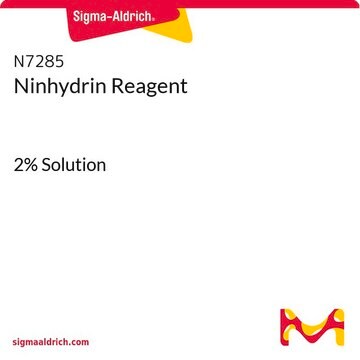1.08175
Thymolphthalein
pH indicator, ACS, Reag. Ph Eur
Synonym(s):
Thymolphthalein
About This Item
Recommended Products
Product Name
Thymolphthalein, indicator ACS,Reag. Ph Eur
grade
ACS reagent
Quality Level
Agency
reag. Ph. Eur.
form
solid
loss
≤1% loss on drying, 110°C
color
white to almost white
visual transition interval
9.0-10.5, colorless to blue
mp
253 °C
bulk density
400 kg/m3
λmax
592-596 nm (buffer pH 10.5)
storage temp.
2-30°C
SMILES string
O1C(c4c(cccc4)C1=O)(c3c(cc(c(c3)C(C)C)O)C)c2c(cc(c(c2)C(C)C)O)C
InChI
1S/C28H30O4/c1-15(2)20-13-23(17(5)11-25(20)29)28(22-10-8-7-9-19(22)27(31)32-28)24-14-21(16(3)4)26(30)12-18(24)6/h7-16,29-30H,1-6H3
InChI key
LDKDGDIWEUUXSH-UHFFFAOYSA-N
Related Categories
Application
- Electrode Based on the MWCNTs and Electropolymerized Thymolphthalein for the Voltammetric Determination of Total Isopropylmethylphenols in Spices: This study developed a sensitive electrochemical sensor for quantifying thymol and carvacrol in spices using an electrode modified with multi-walled carbon nanotubes and electropolymerized thymolphthalein (Chernousova et al., 2023).
- Fluorescence Enhancement Mechanism of Thymolphthalein-Based Probe by Coordination Interaction with Zinc Ion: This research explored the fluorescence enhancement of a thymolphthalein-based probe through coordination with zinc ions, highlighting its potential in analytical applications (Huang et al., 2021).
- pH-Triggered Visual Detection of Escherichia coli Based on the Co-Assembly of Bacitracin and Thymolphthalein: This article presents a novel method for detecting E. coli through pH-triggered visual changes using a thymolphthalein and bacitracin-based probe (Lin et al., 2023).
- Bio-Thymol Containing New High-Performance Thymolphthalein-Based Polybenzoxazine: Thermal, Superhydrophobic and Dielectric Properties: The study reports on a new polybenzoxazine material incorporating thymolphthalein, showcasing enhanced thermal, hydrophobic, and dielectric properties (Srinivasan et al., 2023).
Analysis Note
Appearance: White to almost white powder, eventually slightly yellowish.
Clarity of solution (1 g/l; ethanol): passes test
Absorption maximum λmax. (buffer pH 10.5): 592 - 596 nm
Spec. Absorptivity A 1%/1cm (λmax; 0.01 g/l; buffer pH 10.5; calculated on anhydrous substance): 800 - 900
Transition range: pH 9.0 - pH 10.5 colourless - blue
Transition range (according to ACS): passes test
Transition interval (according Reag. Ph. Eur.): passes test
Loss on drying (110 °C): ≤ 1 %
Storage Class Code
11 - Combustible Solids
WGK
WGK 3
Flash Point(F)
Not applicable
Flash Point(C)
Not applicable
Certificates of Analysis (COA)
Search for Certificates of Analysis (COA) by entering the products Lot/Batch Number. Lot and Batch Numbers can be found on a product’s label following the words ‘Lot’ or ‘Batch’.
Already Own This Product?
Find documentation for the products that you have recently purchased in the Document Library.
Our team of scientists has experience in all areas of research including Life Science, Material Science, Chemical Synthesis, Chromatography, Analytical and many others.
Contact Technical Service






